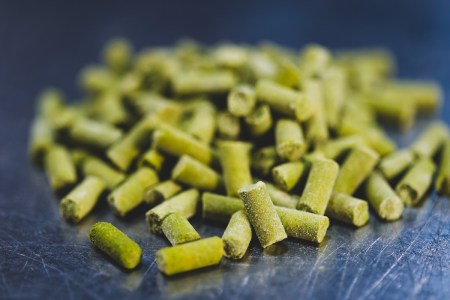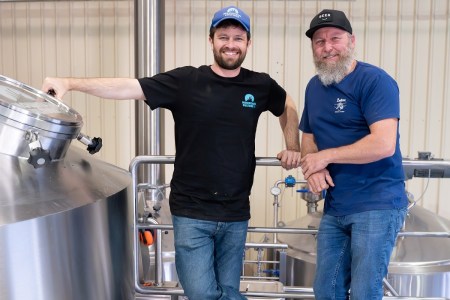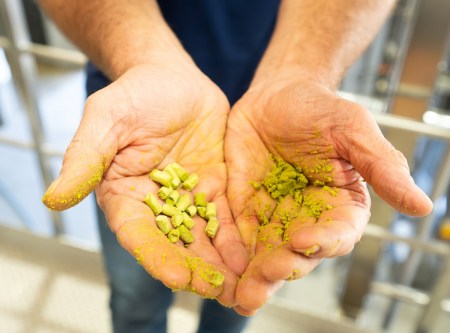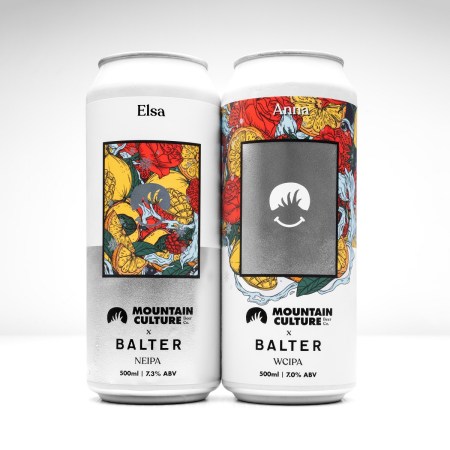
The domain of wet hop beers Down Under is generally accepted as a very short annual window around March when breweries close enough to hop farms, or those willing to go to potentially extreme lengths to get them back to their brewhouses inside 36 hours (give or take), can showcase the characteristics of straight-off-the-bine hop cones in their beers.
That has been the expected norm and something most may have supposed would carry on for as long as harvest beers were brewed.
But that traditional approach has now been turned upside down as Mountain Culture, in collaboration with Balter, release two fresh hop beers today at a time when local hop farms are barely seeing the first shoots of new growth of next year’s harvest. To make matters even more inverted is the fact the hops at the heart of their new West Coast IPA and hazy IPA aren’t local varieties but rather Simcoe, Mosaic and Citra picked and processed fresh in the Pacific North West growing region of the United States last year and then harnessed in Sydney during the 2023 Australian winter to be in drinkers’ hands nationwide this spring. Melbourne’s Deeds Brewing have also this week released their Cryozone Frozen Fresh Hop IPA that likewise heroes Yakima Chief Hops’ YCH-301 trial product.
The alchemy at play in these new releases comes care of the frozen fresh hop technology first made available by Yakima Chief back in 2021. Instead of kilning, their original process involved flash freezing whole fresh hop cones to preserve the hop characteristics we’ve come to expect at harvest time for year-round use in wet hop beers. YCH-301 takes that concept a step further as those frozen cones are then cryogenically processed into concentrated lupulin pellets that allow brewers to use them in recipes just like they would any other hop addition. Strictly speaking, it’s a product that won’t wholly celebrate all that a hop harvest represents and the primary connection between brewer and grower. But it does allow breweries to get amongst the fun who may currently suffer from the tyranny of distance from growing regions to have ever tapped into the phenomenon of brewing with fresh hops before – let alone ones from an entire different country.
Yakima Chief’s technology has been available to mostly North American and UK brewers for a couple of years already but up until now has been beyond the realm of most local breweries simply due to the logistics and expense involved in shipping them frozen across the Pacific. To maintain their integrity, YCH-301 hops must be constantly stored between -18°C and -10°C.

Mountain Culture co-founder and brewer DJ McCready (pictured above on the left with Balter’s head brewer Scotty Hargrave) told Beer & Brewer that getting them to their production facility at Emu Plains required having a 40-foot shipping container – one of an estimated three they’ll receive full of US hops this year – to be kept at freezing temperatures for the entirety of its boat trip to Australia. After arriving, the two pallets worth of YCH-301 on board were then kept literally on ice at a facility in Sydney until Scotty and DJ could get together. (In case you’re wondering, Yakima Chief’s lab said freezing regular T90 pellets – that were in the same frozen container as Mountain Culture’s YCH-301 – is not to their detriment but in fact gives them more stability and allows better preservation of flavour than regular methods of storage.)
“I was worried, that when we actually got around to brewing with them we would get the bags open and they’d be oxidised to crap,” DJ said. “But then we open them up and I kid you not it was like we were back in Yakima last year (for hop selection). The smell was exactly like it was when we were on the ground there, picking fresh hops off the bines and rubbing them in our hands. We were like ‘this is nuts’ – we’re standing in the Blue Mountains and we’re getting the same thing we did in the Yakima Valley. It was amazing.”
Whilst he’s not expecting preserved fresh hops to become the new bastion of the modern IPA, DJ did say that it was yet another advanced hop product now at the disposal of brewers to help deliver incremental gains. Their collaborative beers with Balter – a NEIPA and a West Coast IPA appropriately named Elsa and Anna respectively – use both frozen fresh Simcoe, Mosaic and Citra cryo pellets as well as T90 versions of the same hops from the same harvest.
“I am really excited (about what this type of product allows). Wet hop beers, until this point, have been geographically restricted. Take Scotty for instance, he would have a really hard time getting fresh hops to the Gold Coast. We’re just close enough to Victorian farms where we can drive them back the same day but then only do one batch. But it’s a pretty time intensive thing.
“Using these newer hop products on their own can generally become a little polarising. But (YCH-301) is a really interesting product to use in conjunction with other hop products to enhance things – and that’s what gets me interested.
“I get my hands on this stuff and I’m asking myself ‘how can I use this so it’s not the dominating factor? How will it add that little part to create the greater whole?’.
“And fresh frozen hops live in that realm – to be a small part of many parts that really sets things off.”

It’s clearly a difficult supply chain to navigate, but Yakima Chief’s Australian hops manager James Monshing told us their logistics team is looking at finding solutions to allow YCH-301 to be distributed here more readily in the future. He said it’s early days but if you’re interested, then reach out.
But like DJ, James’ interest is piqued by YCH-301’s possibilities in the brewhouse but also in bringing the global brewing community closer together.
“YCH-301 offers both the brewer and local consumer access to the unique flavour and aromas produced by US fresh hop additions,” James said.
“I think it’s pretty amazing for Australian consumers to be able to drink US fresh hop beers that have been brewed locally. The Aussie brewers themselves have been limited to locally grown hops in the Australian harvest window – this is a way for them to sync up with the US harvest without necessarily travelling to Yakima and surrounds, or even brew a fresh hop beer at any time throughout the year.”
Dry hopping with wet hops
No doubt brewers’ attentions will be most fixed on the fact YCH-301 delivers wet hop characteristics but with all the biotransformative properties and ease of use a dry hop allows.
For past wet hop beers, DJ said he’s employed the far from ideal process of using the mash and lauter tuns as “kind of like a giant randall” where wort is strained through fresh hops.
“We would normally cool the wort down and run it through, but it’s still on the hot side and pre-fermentation – so there’s going to be a lot of character lost. Plus you’re picking up different things from the wet hops when there’s heat involved as opposed to when you’re adding dry hops during post-fermentation.”
But, he said, with YCH-301 he could approach these fresh hop follow ups to last year’s widely successful and well received Bucket Full of Nothin’ collab with Balter much like he would any other.
“I’d like to say (these two new beers) are true-to-style for wet hop beers, but this is kind of unique for a traditional wet hop beer because normally you can’t dry hop with wet hops. So these are much more in your face as far as the wet hop characteristics that come through.
“Scotty and I wanted to go with the two different versions to really showcase how the hops present in the two main IPA styles – clear and hazy.
“And the difference between the two is amazing. The yeast interaction with the hops and what we do with the water in the NEIPA versus the West Coast’s cleaner, dryer, higher IBU characteristics. We thought this would be a nice experiment and so it’s turned out.”

